Related Research Articles

A pollinator is an animal that moves pollen from the male anther of a flower to the female stigma of a flower. This helps to bring about fertilization of the ovules in the flower by the male gametes from the pollen grains.
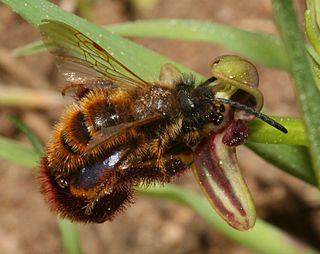
In biology, coevolution occurs when two or more species reciprocally affect each other's evolution through the process of natural selection. The term sometimes is used for two traits in the same species affecting each other's evolution, as well as gene-culture coevolution.

A bumblebee is any of over 250 species in the genus Bombus, part of Apidae, one of the bee families. This genus is the only extant group in the tribe Bombini, though a few extinct related genera are known from fossils. They are found primarily in higher altitudes or latitudes in the Northern Hemisphere, although they are also found in South America, where a few lowland tropical species have been identified. European bumblebees have also been introduced to New Zealand and Tasmania. Female bumblebees can sting repeatedly, but generally ignore humans and other animals.
The following outline is provided as an overview of and topical guide to sustainable agriculture:
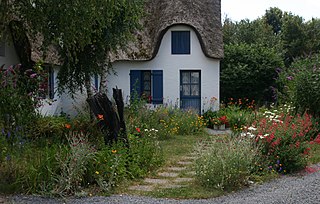
A wildlife garden is an environment created with the purpose to serve as a sustainable haven for surrounding wildlife. Wildlife gardens contain a variety of habitats that cater to native and local plants, birds, amphibians, reptiles, insects, mammals and so on, and are meant to sustain locally native flora and fauna. Other names this type of gardening goes by can vary, prominent ones being habitat, ecology, and conservation gardening.

Pollination is the transfer of pollen from an anther of a plant to the stigma of a plant, later enabling fertilisation and the production of seeds. Pollinating agents can be animals such as insects, for example beetles or butterflies; birds, and bats; water; wind; and even plants themselves. Pollinating animals travel from plant to plant carrying pollen on their bodies in a vital interaction that allows the transfer of genetic material critical to the reproductive system of most flowering plants. When self-pollination occurs within a closed flower. Pollination often occurs within a species. When pollination occurs between species, it can produce hybrid offspring in nature and in plant breeding work.

In ecology, a biological interaction is the effect that a pair of organisms living together in a community have on each other. They can be either of the same species, or of different species. These effects may be short-term, or long-term, both often strongly influence the adaptation and evolution of the species involved. Biological interactions range from mutualism, beneficial to both partners, to competition, harmful to both partners. Interactions can be direct when physical contact is established or indirect, through intermediaries such as shared resources, territories, ecological services, metabolic waste, toxins or growth inhibitors. This type of relationship can be shown by net effect based on individual effects on both organisms arising out of relationship.

Beneficial insects are any of a number of species of insects that perform valued services like pollination and pest control. The concept of beneficial is subjective and only arises in light of desired outcomes from a human perspective. In agriculture, where the goal is to raise selected crops, insects that hinder the production process are classified as pests, while insects that assist production are considered beneficial. In horticulture and gardening, beneficial insects are often considered those that contribute to pest control and native habitat integration.

Asclepias is a genus of herbaceous, perennial, flowering plants known as milkweeds, named for their latex, a milky substance containing cardiac glycosides termed cardenolides, exuded where cells are damaged. Most species are toxic to humans and many other species, primarily due to the presence of cardenolides. However, as with many such plants, some species feed upon milkweed leaves or the nectar from their flowers. A noteworthy feeder on milkweeds is the monarch butterfly, which uses and requires certain milkweeds as host plants for their larvae.
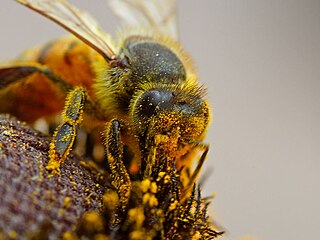
Entomophily or insect pollination is a form of pollination whereby pollen of plants, especially but not only of flowering plants, is distributed by insects. Flowers pollinated by insects typically advertise themselves with bright colours, sometimes with conspicuous patterns leading to rewards of pollen and nectar; they may also have an attractive scent which in some cases mimics insect pheromones. Insect pollinators such as bees have adaptations for their role, such as lapping or sucking mouthparts to take in nectar, and in some species also pollen baskets on their hind legs. This required the coevolution of insects and flowering plants in the development of pollination behaviour by the insects and pollination mechanisms by the flowers, benefiting both groups. Both the size and the density of a population are known to affect pollination and subsequent reproductive performance.
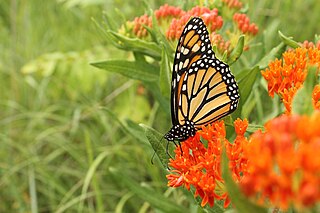
Butterfly gardening is a way to create, improve, and maintain habitat for lepidopterans including butterflies, skippers, and moths. Butterflies have four distinct life stages—egg, larva, chrysalis, and adult. In order to support and sustain butterfly populations, an ideal butterfly garden contains habitat for each life stage.

Gentiana andrewsii, the bottle gentian, closed gentian, or closed bottle gentian, is an herbaceous species of flowering plant in the gentian family Gentianaceae. Gentiana andrewsii is native to northeastern North America, from the Dakotas to the East Coast and through eastern Canada.
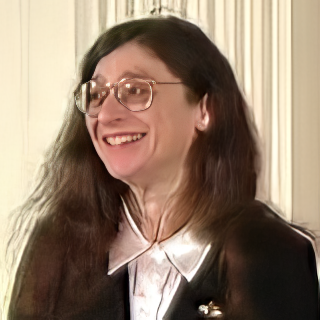
May Roberta Berenbaum is an American entomologist, who is a professor of entomology at University of Illinois Urbana-Champaign. Her research focuses on the chemical interactions between herbivorous insects and their host plants, and the implications of these interactions on the organization of natural communities and the evolution of species. She is particularly interested in nectar, plant phytochemicals, honey and bees, and her research has important implications for beekeeping.

Chamaecrista fasciculata, the partridge pea, is a species of legume native to most of the eastern United States. It is an annual which grows to approximately 0.5 meters tall. It has bright yellow flowers from early summer until first frost, with flowers through the entire flowering season if rainfall is sufficient.
Christina Grozinger is an American entomologist, the Publius Vergilius Maro Professor of Entomology at Pennsylvania State University and the director at its Center for Pollinator Research.
Lynn Dicks is a conservation scientist and ecologist in the UK. She is a Professor of Ecology at the University of Cambridge, Honorary Reader at the University of East Anglia, and an expert in sustainable farming and insect conservation.
Juliet Osborne is an entomologist and ecologist in the UK. She is professor of applied ecology at the University of Exeter and she looks at the health of social insects and how they pollinate plants.

Robert A. Raguso is an American biologist and professor at Cornell University in the Department of Neurobiology and Behavior. He has expanded the field of chemical ecology by introducing and pioneering floral scent as a key component of plant-pollinator communication, with special focus on hawkmoths and Clarkia plants.

A wildflower strip is a section of land set aside to grow wildflowers. These can be at the edge of a field to mitigate against agricultural intensification and monoculture; along road medians and verges; or in parkland or other open spaces such as the Coronation Meadows. Such strips provide an attractive amenity and can also improve biodiversity, conserving birds, insects and other wildlife.

A pollinator garden is a type of garden designed with the intent of growing specific nectar and pollen-producing plants, in a way that attracts pollinating insects known as pollinators. Pollinators aid in the production of one out of every three bites of food consumed by humans, and pollinator gardens are a way to offer support for these species. In order for a garden to be considered a pollinator garden, it should provide various nectar producing flowers, shelter or shelter-providing plants for pollinators, and avoid the use of pesticides.
References
- 1 2 Bristol, University of. "Professor Jane Memmott - School of Biological Sciences". www.bristol.ac.uk. Retrieved 20 December 2019.
- ↑ Bristol, University of. "2019: A Biography of Professor Jane Memmott | School of Biological Sciences | University of Bristol". www.bristol.ac.uk. Archived from the original on 20 December 2019. Retrieved 20 December 2019.
- ↑ Grieves, Chris (6 March 2017). "Influential Women in Ecological Network Research". methods.blog. Retrieved 20 December 2019.
- ↑ Bristol, University of (6 October 2014). "October: Life Sciences opening | News | University of Bristol". www.bristol.ac.uk. Retrieved 20 December 2019.
- ↑ "NERC - Insect Pollinators Initiative". nerc.ukri.org. Retrieved 20 December 2019.
- ↑ Morelle, Rebecca (2 August 2011). "Insects and the city". BBC News. Retrieved 20 December 2019.
- ↑ Press Association, New Scientist & (14 January 2019). "Rich people's gardens are better for bees and other pollinators". New Scientist. Retrieved 20 December 2019.
- ↑ Fowler, Alys (9 August 2013). "Gardens: how to attract pollinators to your plot". The Guardian. ISSN 0261-3077 . Retrieved 20 December 2019.
- ↑ Perrone, Jane (24 July 2014). "Poppy fields forever: meadows take root amid Britain's urban sprawl". The Guardian. ISSN 0261-3077 . Retrieved 20 December 2019.
- ↑ Bristol, University of. "February: Loss of wild flowers matches pollinator decline | News | University of Bristol". www.bristol.ac.uk. Retrieved 20 December 2019.
- ↑ Koumoundouros, Tessa (11 July 2018). "It's Not Just Sea Levels. Here's The Devastating Impact Climate Change Is Already Having on The Web of Life". ScienceAlert. Retrieved 20 December 2019.
- ↑ "The hunger gaps: How flowering times affect farmland bees: Seasonal gaps in the supply of nectar from wildflowers could be leaving bees hungry at times when food is needed most". ScienceDaily. 1 May 2019. Retrieved 20 December 2019.
- ↑ "Editors and Advisory Boards". Science | AAAS. 31 January 2018. Retrieved 20 December 2019.
- ↑ "Marsh Christian Trust – Marsh Ecology Award". www.marshchristiantrust.org. Retrieved 20 December 2019.
- ↑ "Professor Jane Memmott - NBN Conference 2018". National Biodiversity Network. Retrieved 20 December 2019.
- ↑ "Jane Memmott voted President Elect of the BES in first online ballot". British Ecological Society. 10 January 2019. Retrieved 20 December 2019.
- ↑ Weston, Phoebe (1 February 2020). "Help bees by not mowing dandelions, gardeners told". The Guardian. ISSN 0261-3077 . Retrieved 3 February 2020.
- ↑ "No. 63377". The London Gazette (Supplement). 12 June 2021. p. B13.
- ↑ "Jane Memmott". royalsociety.org. Retrieved 24 May 2023.